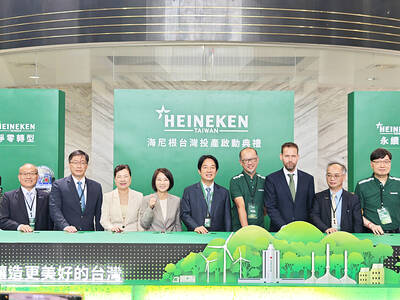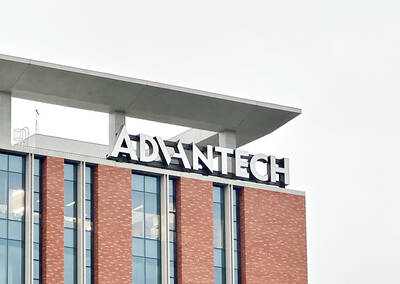The US-China trade dispute poses a tough challenge for Taiwan, but the government’s quick response has helped turn the threat into an opportunity by facilitating a huge repatriation of Taiwanese capital, the minutes of the central bank’s June 20 meeting released yesterday showed.
Board directors shared the view that the trade friction has hit Taiwanese firms hard and fast, as seen by seven straight months of export declines before June.
Some firms moved high-end manufacturing back to Taiwan, while relocating lower-end production to Southeast Asia, they said.
The government has removed investment hurdles and rolled out incentives to lure Taiwanese capital from China and elsewhere, one director said.
So far this year, the Ministry of Economic Affairs has approved 98 applications, with investment valued nearly NT$500 billion (US$16.03 billion).
As more products are manufactured locally rather than overseas, the domestic supply chain would grow and flourish, the director said.
Another director said the swelling of capital repatriation also has to do with the adoption by many countries of the Common Reporting Standard to combat tax evasion.
As some returning investment cases involve domestic bank lending, financial authorities should pay attention to how this would affect loanable funds in the local market, the director said.
One director said that last year’s property transactions recovered to 2013 levels, but the number of vacant units has continued to pick up over the past few years.
The pressure to reduce housing vacancies had been building as seen in the lukewarm presale market, the director said.
The recovery in housing prices and transactions looks more like a return to normal instead of a boom in property sales and value, the director said.
Another board director said that construction and mortgage loans have reached seven or eight-year highs, and new or existing home prices have inched up for several quarters in a row.
Commercial properties and industrial land have also seen an upsurge this year aided by returning capital, the director said.
The director called for close monitoring of the real-estate market and potential loan concentration so that regulators can respond quickly, if necessary, before expectations for home price appreciation take hold.

purpose: Tesla’s CEO sought to meet senior Chinese officials to discuss the rollout of its ‘full self-driving’ software in China and approval to transfer data they had collected Tesla Inc CEO Elon Musk arrived in Beijing yesterday on an unannounced visit, where he is expected to meet senior officials to discuss the rollout of "full self-driving" (FSD) software and permission to transfer data overseas, according to a person with knowledge of the matter. Chinese state media reported that he met Premier Li Qiang (李強) in Beijing, during which Li told Musk that Tesla's development in China could be regarded as a successful example of US-China economic and trade cooperation. Musk confirmed his meeting with the premier yesterday with a post on social media platform X. "Honored to meet with Premier Li

Dutch brewing company Heineken NV on Friday announced an investment of NT$13.5 billion (US$414.62 million) over the next five years in Taiwan. The first multinational brewing company to operate in Taiwan, Heineken made the statement at a ceremony held at its brewery in Pingtung County. It also outlined its efforts to make the brewery “net zero” by 2030. Heineken has been in the Taiwanese market for 20 years, Heineken Taiwan managing director Jeff Wu (吳建甫) said. With strong support from local consumers, the Dutch brewery decided to transition from sales to manufacturing in the country, Wu said. Heineken assumed majority ownership and management rights

coverage expansion: The industrial PC maker has proposed to acquire 3.938 million Aures shares to strengthen its global smart retail presence Leading industrial PC maker Advantech Co (研華) plans to acquire Aures Technologies SA, a French company known for its point-of-sale (POS) and kiosk equipment, to expand its global coverage in smart retail products and services. Advantech proposed to acquire 3.938 million Aures shares from the French firm’s major shareholder and through a public tender offer at up to 6.7 euros per share, the PC maker said in a statement after announcing the deal at the Taiwan Stock Exchange late on Friday. The company aims to acquire up to 100 percent equity of Aures, a well-known brand in the western market with a

Microsoft Corp yesterday said that it would create Thailand’s first data center region to boost cloud and artificial intelligence (AI) infrastructure, promising AI training to more than 100,000 people to develop tech. Bangkok is a key economic player in Southeast Asia, but it has lagged behind Indonesia and Singapore when it comes to the tech industry. Thailand has an “incredible opportunity to build a digital-first, AI-powered future,” Microsoft chairman and chief executive officer Satya Nadella said at an event in Bangkok. Data center regions are physical locations that store computing infrastructure, allowing secure and reliable access to cloud platforms. The global embrace of AI